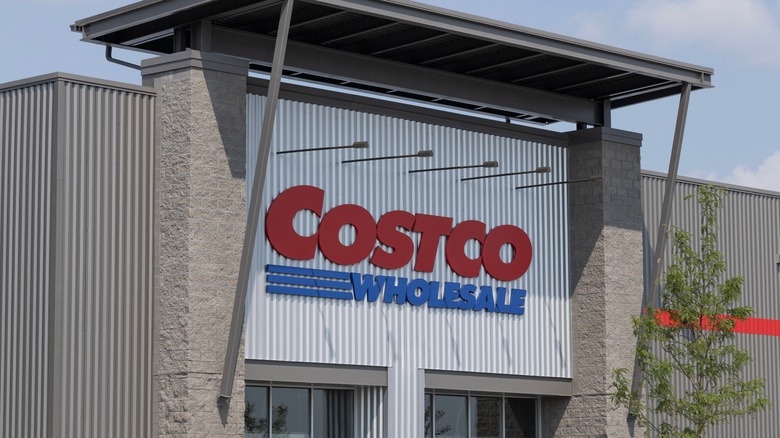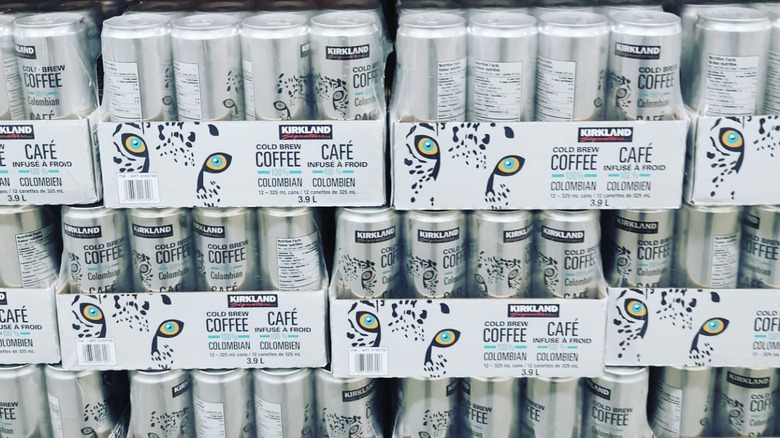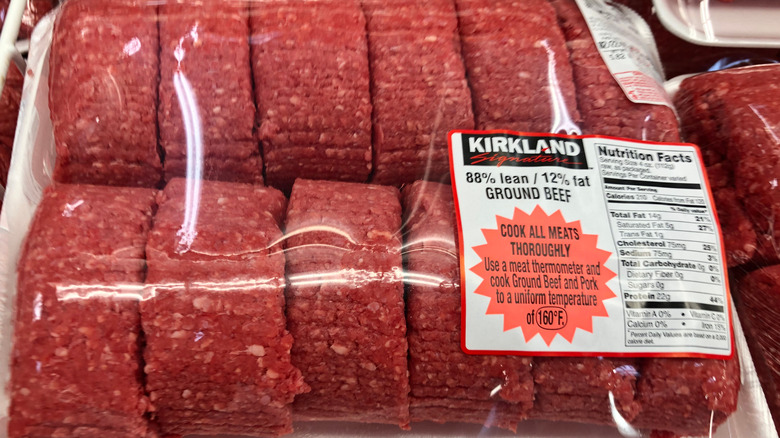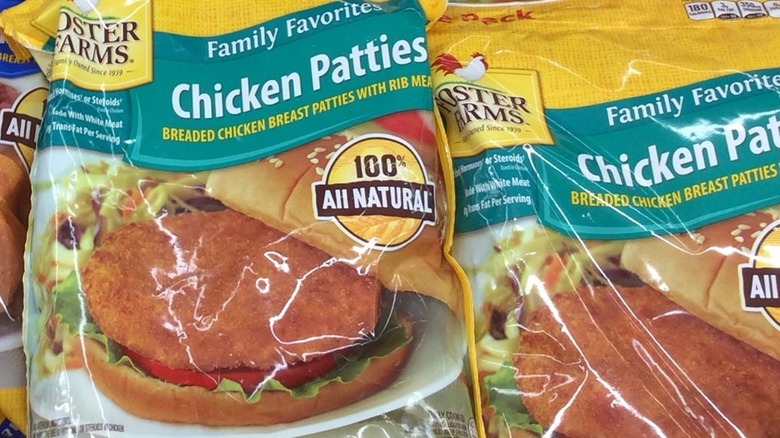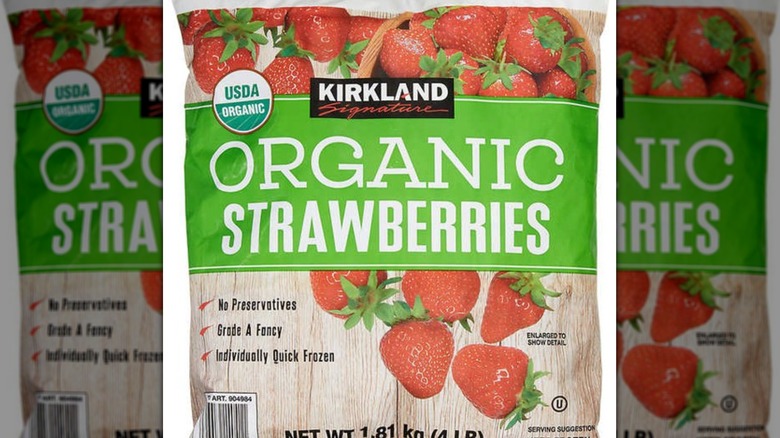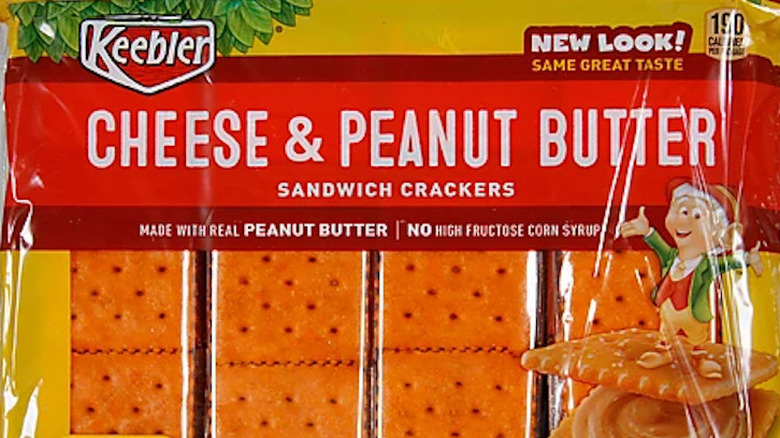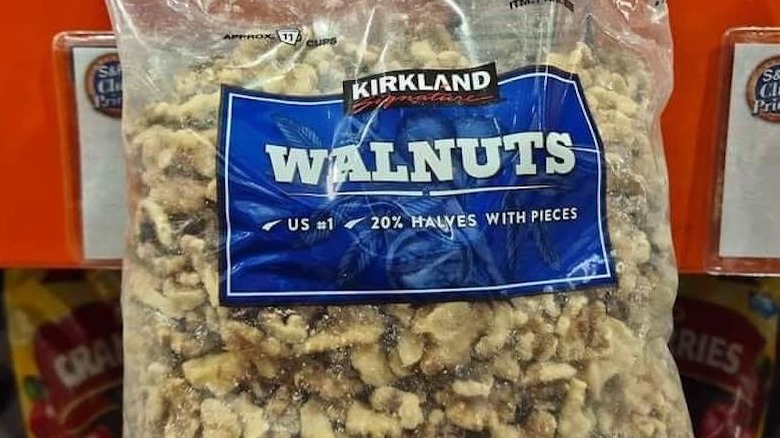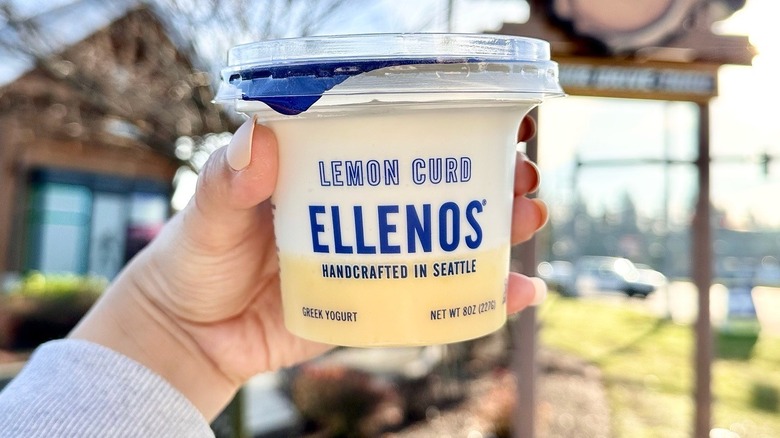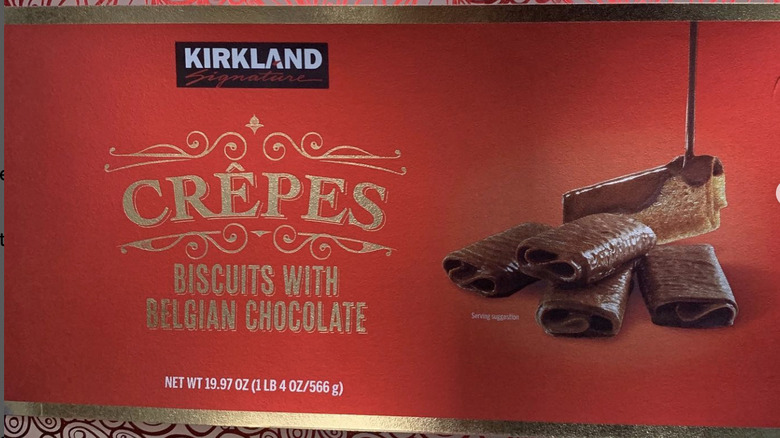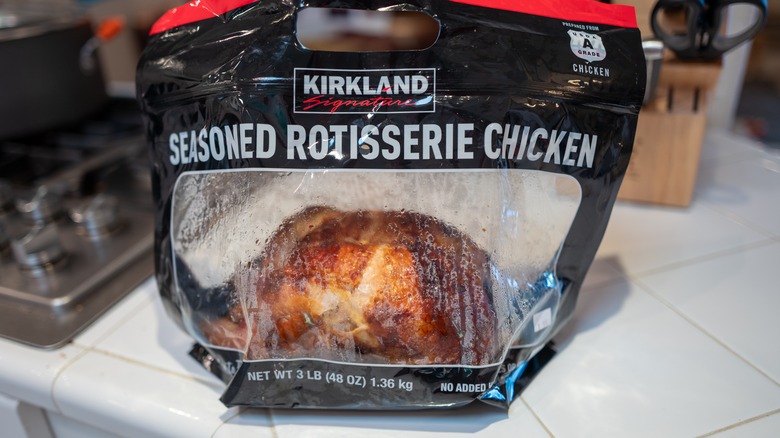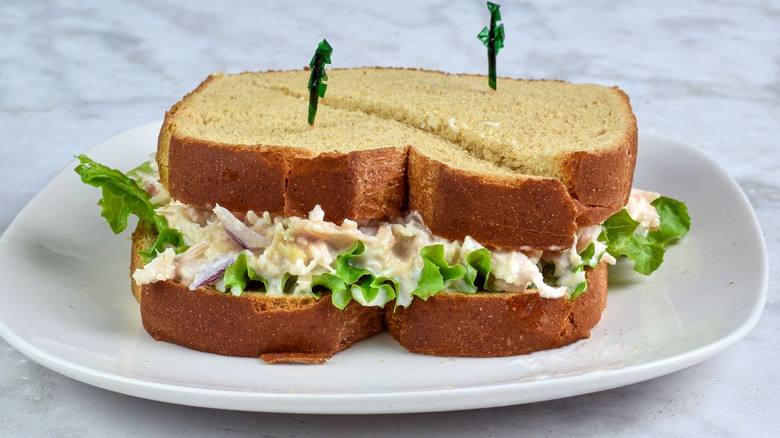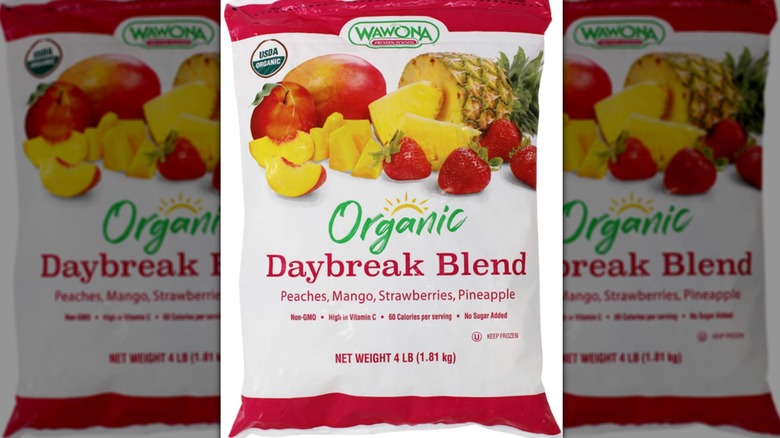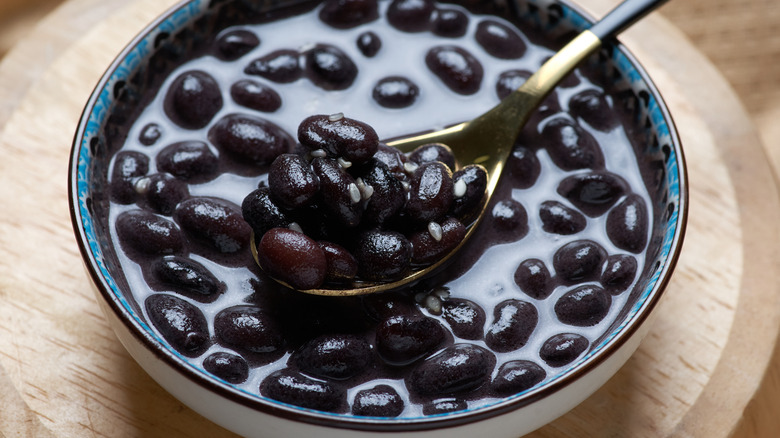Costco Recalls That Affected Millions
Costco, with its business model of selling merchandise in bulk to people who pay for the privilege of shopping at its gigantic, warehouse-style cathedrals of consumption, moves a lot of food. Its 120 million-plus card-holding members utilize the well-stocked food aisles to fill their freezes, pantries, full-size fridges, and beverage coolers. While there's a case against buying in bulk, per-unit cut-rate costs at Costco allow customers to purchase large quantities of staples and snacks at affordable prices.
As one of the biggest grocery purveyors in the United States, it's a big deal and potentially serious, headline-making news when a food distributor or manufacturer orders one of its products to be temporarily removed from Costco, and for customers to throw away existing stock or return it for a refund. That's a recall, and they happen for many reasons — the way that food-borne illness or faulty machinery can easily taint food is usually why Costco will go to great lengths and expense to get an item out of its stores as quickly as possible. It happens with alarming regularity, too, so Costco knows its plan of action. Here are Costco's most far-reaching and potentially dangerous recalls ever, in terms of how many customers they affected.
Kirkland Signature Colombian Cold Brew Coffee
Jumping on the trend of convenient, ready-to-drink packaged coffee as well as the popularity spike of cold-brewed coffee, Costco sells half-cases of pre-made joe in tall, thin metal cans. Distributed under its Kirkland Signature house brand, Costco's Cold Brew Coffee is made from "100% Colombian" coffee beans. In 2023, the 12-packs of the caffeinated beverages were pulled from Costcos because of a production issue. Metal bolts, or traces therein, may have made it into a precious few cans of the stuff.
To be on the safe side, Costco instituted a recall of all Kirkland Signature Colombian Cold Brew Coffee produced between early November 2022 and February 2023. Affected coffee was sold all over in the U.S., including at Costco stores in California, Georgia, New Jersey, Maryland, Michigan, Illinois, Arizona, Utah, Florida, Colorado, Texas, and Washington state. The recall comprised a whopping 2.7 million cans, one of Costco's biggest recalls ever.
Kirkland Signature ground beef
Historically, many of Costco's recalls have been preemptive, with the stores acting to get entire lots or the stock affected or infected food off of its the shelves and out of its bins as soon as it gets word that danger is afoot. Sadly, a 1998 ground beef recall took place at Costco following the hospitalization of a Long Island, New York, woman who ate a burger at an early summer family cookout made from meat purchased at the warehouse store chain.
The company determined that the meat was infected with E. coli, a bacteria that leaves patients, particularly the very young, very old, and immunocompromised, experiencing dehydration, bloody diarrhea, and even death. Costco appropriately approached the recall as if it were an emergency, setting up a toll-free hotline for concerned customers to learn if the meat they'd eaten or bought bore the dangerous product codes. The affected products: 6-pound bags of ⅓ Pound Kirkland Signature Ground Sirloin and Loin of Beef Patties, and 6-pound bags of ¼ Pound Kirkland Signature Ground Beef Patties, all processed in early April 1998 at a facility in Tracy, California. Costco asked customers to refrain from cooking and eating those products — which had been sold in 24 states — and to return all unconsumed patties to any store. Total breadth of the meat recall: 172,000 pounds of beef.
Foster Farms Chicken Patties
Costco sells many frozen meal components, including large containers of meat patties. In the early 2020s, it sold a 5-pound, resealable bag of Chicken Patties made by poultry giant Foster Farms, consisting of formed breast and rib meat battered and fried, perfect for reheating and using on sandwiches. In October 2022, Foster Farms recalled a batch of its Costco stock due to a lingering danger to consumers. Hard, firm, and sharp pieces of plastic had been discovered in one lot of the product, which if consumed could cause notable injury.
Foster Farms determined that the questionable chicken was all produced at a single processing center on a single day, August 11, 2022, and then sent to Costco's distribution centers for sale in warehouse stores throughout Washington state, Utah, Colorado, California, and Arizona. In all, Foster Farms had to recall 148,000 pounds — or about 30,000 Costco-size bulk bags — to prevent harm. The recall was effective, with the issue discovered early enough that no injuries or deaths related to unwittingly eating plastic inside of Costco-bought chicken patties were reported.
Kirkland Organic Strawberries
A big bag of organic strawberries has a lot of uses (even down to the tops), from desserts to fruit salads to smoothies, which you might be making all wrong. Costco sells a 4-pound frozen bag under its Kirkland Signature house brand. In March 2023, the company briefly pulled particular lots of that product out of the freezer section of many of its stores after the discovery of a potential link to a hepatitis A upswing. Costco contracted with San Diego-based produce distributor California Splendor to package its Kirkland Signature Frozen Organic Strawberries, and possibly tainted ones were sold at Costco facilities throughout Los Angeles, San Diego, and Hawaii. The recall was later expanded to include Rader Farms Organic Fresh Start Smoothie Blend, sold at Costco locations in California, Arizona, Texas, and Colorado from late 2022 to the summer of 2023.
Hepatitis A is a highly transmissible virus that can cause symptoms like stomach pain and jaundice as well as liver failure. The disease can spread if infected people handle food. But because hepatitis A symptoms may not manifest for as long as 15 to 50 days after infection, and the product could have remained in customers' freezers for months, the recall remained in effect for months. Over the course of the outbreak, nine people fell ill from consuming tainted berries, but from brands purchased at stores other than Costco.
Austin and Keebler peanut butter crackers
After salmonella was first detected in a batch of King Nut brand peanut butter in January 2009, the Minnesota Department of Health put out the first warning that products made by Peanut Corporation of America may be tainted with the food-borne illness that may cause abdominal cramping, nausea, vomiting, headache, chills, dehydration, or even death. As PCA provided the nuts used to make peanut butter or the peanut butter in products made by other, bigger food companies, salmonella contamination was possible in more than 3,900 individual products.
The outbreak was linked to peanuts processed in 2007 and 2008 at facilities in Texas and Georgia, and Costco had sold affected Keebler and Austin brand peanut butter sandwich crackers at its stores. Because Costco is a membership-based chain, it was able to almost instantly pinpoint who in its customer base had purchased the dangerously infected peanut butter crackers and sent an automated, recorded message urging them to not eat the snacks and return them to a store for a refund. It was a much speedier practice than Costco's previous letter-based system, and it likely saved lives. An estimated 710 people in 46 states got sick on salmonella from peanuts and peanut butter, and eight people died. PCA owner Stewart Parnell was later found guilty of fraud and sentenced to prison for intentionally allowing dangerous tainted food to enter stores like Costco.
Kirkland Walnuts
Except for those who are allergic to tree nuts, walnuts are a very healthy food, providing protein and healthy fats while also being a versatile snack and cooking and baking ingredient. Costco sells walnuts by the giant bagful, usually and most prominently in a 3-pound bag of de-shelled and halved nutmeat under the Kirkland Signature umbrella brand that can hang around a fridge or inside of a cupboard for many months. Just before the annual holiday baking season and subsequent stocking-up period began, Costco issued a recall of its Kirkland Shelled Walnuts bought at its stores in September and October of 2022.
Costco handled the recall on behalf of its supplier, California-based grower Mid Valley Nut Company. Fortunately, no one who had purchased the walnuts that had been picked, processed, packaged, and purchased bore the effects of any kind of food-borne illness. The massive product pull-back happened because the nuts smelled and tasted suspiciously off. They weren't toxic or dangerous — but customers would likely have objected to what the recall notice cited as a "stale taste and rancid smell."
Ellenos Vanilla Bean Greek Yogurt
One of the most common — and dangerous — food allergies is the inability to process eggs. Those afflicted who unknowingly eat that omnipresent binder and protein source may suffer gastrointestinal distress, rashes, or anaphylaxis. This is why food labeling is so important — people with an allergy to chicken eggs, and any other food for that matter, need to know if that potentially toxic ingredient is secretly lurking in a packaged product before they purchase or consume it.
Such stakes made a factory screw-up into a potential medical disaster in May 2023. Yogurt brand Ellenos offered its extra-thick, Greek-style yogurt at Costco in 4-ounce containers sold in packs of 12. When customers got their vanilla bean Ellenos yogurt home and peeled off the lids, they found not the expected black-speckled white goop, but rather a pale yellow product. The yogurt itself was safe to eat, as the discoloration wasn't due to the product turning rancid — it was lemon curd yogurt mistakenly packed in containers labeled "vanilla." Costco acted quickly to get Ellenos Vanilla Bean Greek Yogurt out of its stores in Washington state, Oregon, and Alaska.
Kirkland Signature Crepes
The first thing that comes to mind at the mention of "crêpes" are those thin, French pancakes stuffed with any number of ingredients and folded over. Costco doesn't make or sell those kinds of crêpes, but it does carry a product called Kirkland Signature Crêpes. Very thin, buttery ladyfinger-sized cookies, they're labeled as biscuits that have been enrobed in seemingly premium Belgian chocolate.
The Kirkland crêpes are a popular seasonal item, rolled out during the end of the year holidays as they're good for entertaining and gift-giving. But in January 2023, Costco told its customers that it might not want to eat any of those chocolate-covered biscuits they still had left over from 2022's celebrations. Fortunately, the recall wasn't issued over a safety issue or a food-borne illness outbreak. Customers who had registered as having bought the product received information about how the crêpes just didn't look right. "It has come to our attention that some crêpes may be discolored," Costco's recall advisory warned over the cookies sold throughout Canada and on its website from August to December 2022. Refunds of the entire purchase price were offered upon return to stores for the treats that didn't look as good as they should.
Costco Rotisserie Chicken derivatives
In part because there are so many weeknight meals to make with a rotisserie chicken, that item is one of Costco's most famous and reliable items. The warehouse store chain processes more than 100 million chickens each year, which breaks down to about 180,000 birds per store. Costco's version sits in the middle of the ultimate ranking of grocery store rotisserie chickens, and what doesn't sell right away at the very low price of $4.99 is repurposed into money- and waste-saving products sold in the Costco deli section, like chicken salad, chicken noodle soup, and chicken chili. That's a big volume of chicken-based products coming out of even one Costco kitchen each day, and it was particularly catastrophic when a well-traveled store in South San Francisco was found to be the source of a salmonella contamination.
In October 2013, the U.S. Department of Agriculture divulged that a recall was in place for Costco and Kirkland products made with rotisserie chicken, including soup, salad, and chicken parts and pieces due to salmonella that originated at supplier Foster Farms. One person was immediately sickened by Costco rotisserie chicken, while Foster Farms poultry sold at other locations around the U.S. led to more than 300 salmonella infections across 20 states. For its part, Costco ordered a recall of 39,755 pounds' worth of chicken from that single Bay Area warehouse.
Costco Rotisserie Chicken Salad
A horrifying outbreak of the illness E. coli hit seven states in November 2015. Nineteen people fell ill from eating foods that hadn't been properly cooked to kill the bacteria, and they were subject to symptoms that included severe gastrointestinal issues and dehydration. About a quarter of the victims needed hospitalization to fully recover, and the one major connection that linked everyone: They'd all eaten rotisserie chicken salad prepared at different Costco stores. Upon more investigation, health authorities determined that the ingredients at fault were two ingredients in the salad: diced celery and onions purchased from Taylor Farms Pacific. The produce supplier, with Costco's assistance, announced a recall of about 154,000 total products that relied on its ready-to-use onion and celery blends. After federal authorities informed Costco of the outbreak, the company quickly pulled the chicken salad out of circulation in 17 states, just to be safe.
Taylor Pacific also supplied the raw ingredients for other supermarket chains with in-house service delis and packaged food manufacturers. The recall affected products sold and made at Target, Sam's Club, Starbucks, and Walmart, too. But most people who got sick fell ill because of Costco. In the first week of the outbreak alone, 14 out of 16 infected people had consumed the rotisserie chicken salad.
Wawona's Organic Daybreak Blend
A very convenient aspect of frozen fruit is also one of its main selling points. If stored properly at the right temperature in a sealed container, fruit can last for months inside of the average home freezer, allowing consumers to routinely pull out a cup of what they need each morning to make a smoothie. That's the idea behind an all-organic, smoothie-recommended fruit collection produced by Wawona Frozen Foods, the Daybreak Blend — just raw, ready to blend frozen strawberries, peach pieces, mango chunks, and pineapple bits.
Because it was sold with that method of consumption in mind, in large, bulky bags at Costco — the Daybreak Blend was available at the warehouse chain in a 4-pound size — a recall went into effect long after the product was actually on sale. In June 2023, the FDA announced that Wawona had willingly reissued a recall on its Costco-sized Daybreak Blend bags because the strawberries had come from a facility in Mexico where they may have acquired the transmittable Hepatitis A virus. The bags in question still hadn't passed its sell-by date, but they'd been produced far earlier, as early as April 2022, and distributed to Costco outlets in Utah, Colorado, Washington state, California, and Arizona.
Products made with S&W Black Beans
One common mistake made with canned beans: consuming them when they aren't safe to eat. In April 2021, canned goods company Faribault Foods recalled items it produced just for Costco. The warehouse store sold large multi-packs of S&W brand black beans and chili beans at the time, until Farribault ordered a stop to that because of concerns that some shipments of the legumes featured cans that hadn't been properly sealed. At risk to expand or allow in foreign materials, such cans offered a hospitable environment for the toxic bacteria botulism. Symptoms of eating botulism-tainted food include breathing issues, a lapse in motor skills, vision problems, and the inability to swallow correctly.
Faribault Foods launched the recall after fielding Costco customers' complaints and concerns who noticed the lack of proper seals on some lots of the S&W beans distributed as far back as August 2020. A month later, Faribault expanded the recall, determined to route out bad beans in Costcos situated throughout the West Coast, in Rocky Mountain states, and in Texas, Arkansas, Georgia, and Hawaii.
